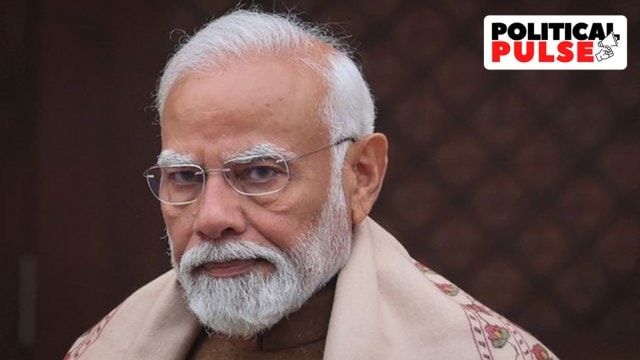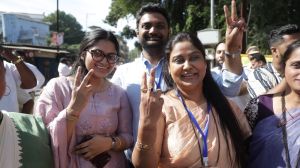Four years after the Citizenship (Amendment) Act was passed, its rules have been notified just ahead of the next general elections as the Narendra Modi government wants to emphasise its message to voters that “Jo kaha, voh kiya (delivered all that we promised)”.

The CAA had been brought in and passed within months of the 2019 Lok Sabha elections, in which the Act was part of the BJP’s manifesto promises. It eased the citizenship process for “persecuted religious minorities” from neighbouring countries Pakistan, Bangladesh and Afghanistan who had entered India before December 31, 2014 – hence, covering Hindus, Parsis, Sikhs, Buddhists, Jains and Christians, and excluding only Muslims.
Seen as discriminatory towards Muslims, the Act had triggered protests across the country, forcing the government to pause its notification. As the wait for its rules to be notified dragged on, Opposition parties attacked the BJP for talking about the CAA only close to elections, just so to polarise voters.
Now that the CAA has come into force, the BJP will hope for electoral gains in West Bengal, which has a huge population of Hindus who migrated from Bangladesh and have been demanding citizenship rights. The Trinamool Congress-ruled state with its 42 seats is a good catchment area for the BJP if Modi’s goal of winning 370 seats in the coming Lok Sabha polls is to come true. The BJP had won 18 seats in Bengal last time.
While BJP leaders admitted they expected protests over the CAA’s implementation, at least in some parts, unlike the widespread agitation of 2019, sources said the government is confident of ensuring these do not get out of control. The government will be particularly concerned about party-ruled Assam, where citizenship to “outsiders” is a touchy issue.
But what the BJP is counting on is that the move reinforces Prime Minister Modi’s image of a “doer” and “decisive leader”, a BJP leader said. “This will embellish Brand Modi, boosting his image in Hindu minds. It’s not just in West Bengal, be it Uttar Pradesh or Telangana or Maharashtra, the slogans for Modi will be ‘Jo kehte hain, so karte hain… Hindu hit ki raksha karte hein (We do what we say… protect Hindu welfare).”
Story continues below this ad
The two groups in Bengal which can hope for their citizenship exercise to be speeded up are the Matuas (a Dalit Hindu group with roots in Bangladesh) and Rajbanshis (who include Hindu refugees from Bangladesh). BJP leaders said it might also consolidate the larger Hindu vote behind the party.
In Assam, the CAA is seen as contradicting the promise made to the state in the Assam Accord, which set a cut-off year of 1971 for recognition of migrants who had entered the state. By Monday evening, there were reports of sporadic protests in the state over the CAA issue.
A senior BJP leader admitted that things were about to get “tough” for the party government in the state. However, he said: “The CAA is an ideological commitment of the party. The BJP cannot go to the elections without fulfilling that promise.”
The Modi government had committed itself to bringing in a CAA – arguing that India was the natural home of all “persecuted” Hindus – in addition to its three core promises of a Ram temple at Ayodhya, abrogation of Article 370 and a Uniform Civil Code.
Story continues below this ad
A senior leader said the leadership trusted Assam Chief Minister Himanta Biswa Sarma to “handle” the situation. “The state administration has had enough time to prepare for this.”
BJP leaders also played down the possibility of the issue having an impact on the polls, pointing out that despite protests against the CAA that were already on in Assam, the BJP had won nine of the 14 Lok Sabha seats in the 2019 general elections.
The BJP along with its allies had also returned to power for the second straight term in May 2021, after the passage of the CAA.
In Bengal, which also saw state elections in 2021, the BJP had emerged as the main Opposition party, but performed poorly in North 24 Parganas and Nadia districts bordering Bangladesh. This was seen as a reflection of the Matua anger against the BJP for failing to notify the CAA. The Rajbanshis, though, had stayed with the BJP in large numbers.
Story continues below this ad
“The party could have lost the support of both the communities this time had the CAA not been implemented,” the BJP leader from the state said.
The ‘NRC’ apprehensions
In its 2019 manifesto as well as its statements since, the BJP has sought to ease the apprehensions surrounding the CAA. “We will make all the laws to clarify the issue to sections of the population from the Northeastern states who have expressed apprehensions regarding the legislation. We reiterate our commitment to protect the linguistic, cultural and social identity of the people of Northeast,” its manifesto had said.
The government has also said that the CAA is “a law to give citizenship”, “not take away the citizenship of any Indian citizen, irrespective of religion”. “This Act is only for those who have suffered persecution for years and have no other shelter in the world except India,” it has said, adding that the Constitution grants the government “the right to provide religious persecuted refugees with fundamental rights and to grant citizenship from a humanitarian perspective”.
But one reason that apprehensions regarding the CAA have refused to die down, especially among the Muslims, is the belief that this is a step towards an NRC – as Shah put it, “Aap chronology samajhiye (understand the sequence)… first CAA, then NRC”. The NRC, or a National Register of Citizens, would be an exercise to specifically identify illegal migrants, and the Muslims fear that only they would not be able to avail the benefits of the CAA in that case.
Story continues below this ad
The only state that has been able to conduct an NRC so far is Assam, where too the final list is in an imbroglio over its numbers. However, the fear that the Modi government will push it through remains, particularly as “infiltration” is a key concern of the RSS as well.
Critics of the CAA also see it as violative of Article 14 of the Constitution, which mandates equality before law and equal protection of the law to all, saying that exclusion of all illegal Muslim immigrants from the benefits of the Act was not a “reasonable” classification. The matter is pending with the Supreme Court.
The RSS link
There is another ‘link’ with the RSS. Soon after Partition, Sangh leader Syama Prasad Mookerji had taken up the “persecution” of Hindus in East Pakistan. A steady stream of refugees kept coming to India at this time, when Mookerji was a minister in the Nehru government.
There was pressure on the Nehru government to find a solution, with Union Home Minister Sardar Vallabhbhai Patel backing a firm line against Pakistan, and Nehru looking for a negotiated settlement. In April 1950, Nehru invited then Pakistan PM Liaquat Ali Khan to Delhi, and the talks eventually led to a pact calling on both sides to provide “equality, freedom and justice” to their minorities.
Story continues below this ad
As per B D Graham, a noted scholar of the Jana Sangh, Mookerji demanded that there be a clause to provide for sanctions should a side fail to honour the agreement. When this was not inserted in the Nehru-Liaquat pact, he resigned from the Cabinet.


































